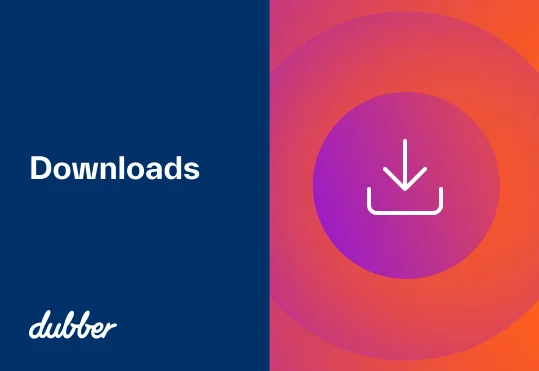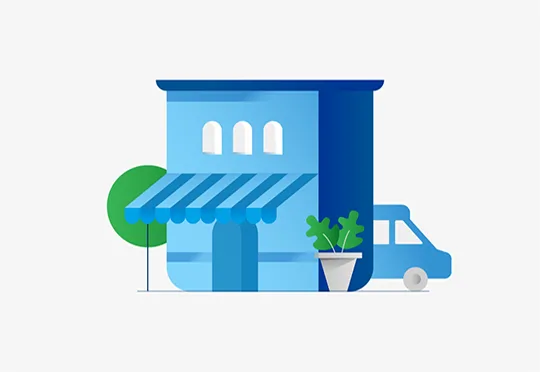
Dubber and IBM to provide Cognitive Call Solution

Notice of Annual General Meeting

Company Presentation

Contact centres would be nothing without their agents. As the first point of contact for customers, contact centre agents are the face, or voice, of the company. Organisations with contact centres need to ensure they nurture their agents and provide them with the tools they need to give the best customer care.
With contact centres such an important part of a business, it is important that organisations do what they can to improve employee morale. They must also make sure agents are not held back by technological limitations. When developing our call recording services we had contact centres in mind. We made sure that our Always On call recording and Zoe voice AI could help solve some common issues.
Improve the performance of contact centre agents with morale-boosting AI
In a contact centre, workers cannot just pick up their tasks when they return to work after an absence. Customers will continue to contact the organisation no matter how understaffed the contact centre may be, and it’s up to the remaining agents to manage the workload. At peak hours, this can be stressful for agents who are forced to handle more calls than usual.
When building our call recording solution, we wanted to find ways for organisations to learn more about their customer interactions and the way their business works. We know that an agent’s morale can decrease when understaffing creates a bigger workload for them. This is why we wanted to create technology that can help organisations to reward contact centre agents who outperform at their job. The sentiment analysis of Zoe, our voice AI service, uses speech characteristics to identify the mood of a caller throughout a conversation. Zoe then assigns the call with a positive or negative score. Agents who consistently achieve positive scores can be rewarded for their hard work, and feel like their success can finally be measured and recognised.
Increase the efficiency of your contact centre agents with automated workflows
Contact centre agents often have to use a variety of different software during their working day. This may include CRM databases and workforce management tools. With these different applications, agents may have to familiarise themselves with numerous different interfaces; jumping from one window to another to perform different tasks.
At Dubber, we didn’t want to add yet another interface to deal with. That’s why we made sure that, via our open API, an organisation can integrate our service with other applications. Our API allows developers to integrate Dubber’s functionality into existing systems. This allows the call data and recordings we collect to be used in other applications. It also allows other applications to use our technology, such as our AI or search functionality, to automate processes. For example, a manager could receive a Slack notification after a certain word is spoken during a call.
With the contact centre representing an organisation at key moments on a customer’s journey — enquiring, placing orders, making complaints — it is important to look after your contact centre agents and get the most out of your data. Contact a member of the Dubber team to see how you can provide the best solution for your contact centre.

Technology has the power to make a small business big. Unfortunately, 30% of small business owners find it hard to adapt to new technology, according to a survey undertaken by AT&T.
Common obstacles for small business
Early adoption of technology can be make or break for a small business, but they need help and support in order to take steps towards digital transformation. Many small business owners feel that they are not in a financial position to adopt new technology. With the introduction of SaaS products, smaller businesses now have access to advanced technology for an affordable monthly subscription.
Of course, money is not the only resource that is scarce within the world of small business. Time is another valuable asset that companies of this size are often lacking. New technology must save time for an organisation and not require lengthy installation processes that disrupt current workflow.
Call recording and voice AI as a service
Dubber have democratised call recording and voice AI. We have made this technology available to businesses who previously were discouraged from adopting such services, due to the prohibitive cost of legacy solutions. We’ve also transformed the onboarding process: cutting the time and costs required to deploy our cloud call recording. We even created Dubber Connect to make provisioning customers even easier and reduce the disruption that can be caused by implementing new solutions.
With our limitless storage, there are no hidden costs. Customers can choose the storage plan most suited to their needs. If it turns out they want to increase their minutes allowance or storage length they can change to a different subscription at any time. This flexibility gives small businesses the reassurance that they aren’t committed to a solution that may in the future become too expensive.
Showing the value in voice to small business
Small businesses need to be shown that call recording is no longer solely for compliance. It’s not just for huge enterprises with vast contact centres. SMBs can benefit from capturing their communications too. To illustrate the ways in which businesses of all sizes can benefit from call recording, use cases are a great way to convince customers. Taking the time to enlighten your user base can result in an expanded market and increased revenue.
Digital transformation is something that many organisations are undertaking. With many aspects of business moving to the cloud, small companies shouldn’t be left behind.

Dubber Annual Report 30 June 2018

We’ve updated our API to make it super easy to access and manage team information. With the updates, service providers and their customers no longer have to log in to the Dubber portal to create and manage teams and their members. Using the API, service providers will be able to administer customer accounts straight from their own portal, as well as enabling customers to manage their own accounts through third-party applications, including their CRM.
Each account will automatically get a team named ‘All’, which cannot be deleted. New teams and their members can be easily managed through the API and Dub points can also now be created and deleted via the API to add and remove call recording implementation easily.
With multiple interfaces a part of modern working, this API update means one fewer application open on your desktop. Account admins can manage their teams from an existing application that they are familiar with, allowing colleagues to share their calls more easily.
The techie bit
We have updated our developer page to include the updates to our API. This page includes samples of how to access the Dubber API can be accessed. All these samples provide the URL for the Sandbox environment, allowing for safe and easy testing of any new developments.
Scroll down our developer page to find the new teams updates
For example, to create a new team member in an existing team, the API request would be:curl -i -k -H "Authorization: Bearer " \
-X POST "https://api.dubber.net/sandbox/v1/accounts//teams//members" \
-H "Content-Type: application/json" -d '{ "user": "johntravolta-dubber-net", "listener": true}'
This would receive the following response:HTTP/1.1 201 CREATED
{
"id": 1234,
"user": "johntravolta-dubber-net",
"date_created": "Wed, 09 Oct 2013 22:39:19 +0000",
"date_updated": "Wed, 16 Oct 2013 00:48:40 +0000",
"listener": true
}

- CBTS integrates Dubber cloud call recording platform for Call Capture and Analytics
- Incumbent telecommunications carrier in greater Cincinnati, Ohio area, with national US business footprint
- Dubber Platform to be available to CBTS Customers from May 2018
- Migration of 2,800 call recording users to Dubber platform by end of CY Q2 2018
Dubber has been selected by tier one regional telecommunications provider, CTBS – https://www.cbts.com – a wholly owned subsidiary of Cincinnati Bell, to provide cloud call recording for its CBTS product portfolio.
Headquartered in Cincinnati, Ohio, the company is a tier one regional service provider that provides integrated communications solutions – including local and long-distance voice, data, high-speed Internet and video to residential and business customers in the Greater Cincinnati and Dayton areas. Through wholly owned subsidiaries CBTS and OnX, the company also provides business communications and IT services to customers throughout the USA and Canada.
CBTS will integrate the Dubber platform to provide market-leading call capture and analytics into its CBTS product portfolio by the end of May 2018. In addition, the company is immediately transitioning 2,800 call recording users on legacy systems onto the Dubber platform. This transition will be completed by the end of CY Q2 2018.
Steve McGovern, CEO, Dubber:
“We are delighted to be working with CBTS to support them for their call recording requirements on the CBTS Business platform. As a significant regional service provider in the United States, they are viewed as a market leader and innovator in the markets they serve. By integrating the Dubber platform as a feature rich, value-added service for users, the company will be able to provide their business customers with the most scalable cloud call recording and analytics platform available. We are looking forward to working closely with the CBTS team as they deploy and roll out the Dubber platform to their customers and prospects.”
The CBTS agreement will advance Dubber’s strategy to accelerate active users and associated revenues while establishing global leadership in cloud call recording and voice data management.

DUB Interim Financial Report 31 Dec 2018

At Dubber, we have built our products and services in the cloud: benefitting from the unlimited scalability and storage that this provides. We have chosen Amazon Web Services to enable us to provide high levels of security, reliability, and service. Our infographic shows how a move to the cloud can bring numerous advantages.

